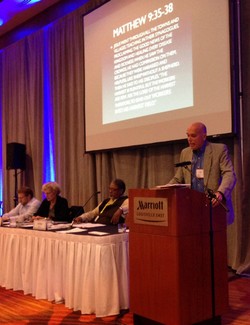The Presbyterian Church (U.S.A.) should focus on making disciples, evangelism coordinator Ray Jones and associate David Loleng told the Presbyterian Mission Agency Sept. 26.
“Jesus didn’t say, ‘Go out and make programs, converts, budgets, causes, buildings, rules or regulations,’” Loleng said. “But he did say, ‘Make disciples,’ who become part of God’s healing and wholeness in the world, addressing the ‘isms’ in our world.”
During their 45-minute presentation, Loleng and Jones addressed their vision of integrating justice and evangelism to more faithfully make compassionate prophetic disciples.
“What does it mean to be a disciple?” Loleng asked. “Follower … imitator … Christian … apprentice,” were just some of the responses Loleng repeated.
Pausing for emphasis, he said, “A disciple learns less through instruction than experience and practice.”
Jones introduced board members to the newly released Engage: Discipleship curriculum produced by Congregational Ministries Publishing. A three-part series focusing on gospel, discipleship and mission, Engage is based on a well-loved evangelism ministry resource by the same name.
“In our work, we are growing disciples to become missionaries by engaging in God’s mission in their neighborhoods and communities,” Jones said. “Disciples who receive God’s forgiveness and freedom in Jesus and invite others into relationship with God, which brings healing reconciliation.”
Both Jones and Loleng gave examples of what this looks like from churches they served before coming to the mission agency.
Jones remembers a woman coming to him from their community, asking him if the congregation knew there was gang activity going on behind their church.
“I told her I’d read about it in the newspaper. She responded by asking if we would go with her on a prayer walk through our community,” he said.
After praying with community members for all kinds of things on the walk — even laying hands on the graffiti — Jones remembers the church getting more engaged with its neighborhood by volunteering at the local school.
Jones encouraged board members to go into their communities. “Ask them, ‘What are your greatest needs? How can the church meet them?’” he said. “Then allow your heart to be broken by what breaks God’s heart.”
Loleng served a church in Southern California started in a bar by a chain-smoking judge. Two people who helped the church grow were Roy Rogers and Dale Evans. “It was a celebrity, country club type church. They were very active in the social justice movement. In the ’60s, I couldn’t have bought a home there,” said Loleng, who is Filipino. “Their mission helped change that.”
But over time, the church forgot its missional history — until the weekend kids in the changing neighborhood graffitied the church.
In an emergency meeting, the session spoke of all of the systematic ways to deal with this until a respected older adult woman stood up. “I think these kids are trying to reach out to us,” she said.
“You could hear a pin drop in session,” said Loleng. “Just like you can now.”
The church began reaching out to its neighbors — those living in intergenerational poverty, the mentally ill, those recently released from a nearby prison and those addicted to drugs.
“Before I left we were serving over 100,000 meals and helping over 9,000 people a year,” Loleng said. “We had contracts with local motels for homeless people. Crime went down by 85 percent.”
Loleng was particularly moved by what a young adult who had been reached by the church told him. Her faith in Christ and the tangible love and support of the church rescued her from a life of drug addiction and incarceration. Her mother was a teen when she gave birth, as was her grandmother.
“You don’t know how much you and the church have meant to me,” she told him. “You have allowed me to see how much Jesus loves me.”
Loleng remembers saying to her, “When I look at you and your life, I see the carpenter from Galilee.” Jesus had changed the generational brokenness her family had been in.
He added, “The church rediscovered it missional DNA. They were no longer the church of Roy and Dale. They were the church of Jesus.”

